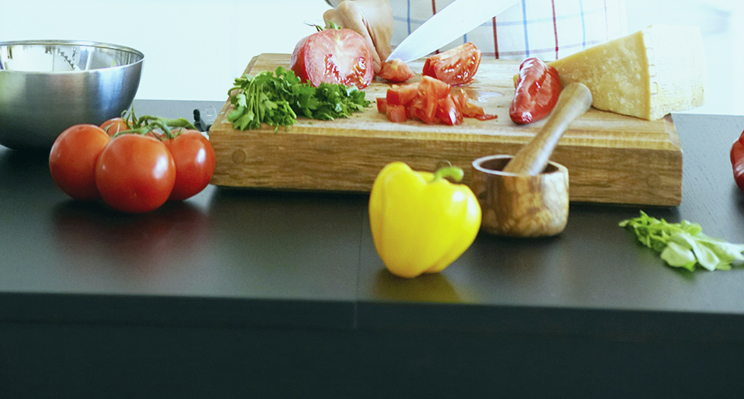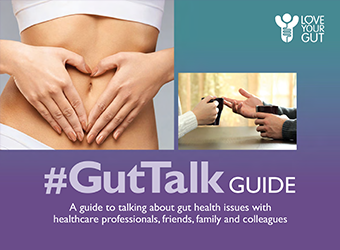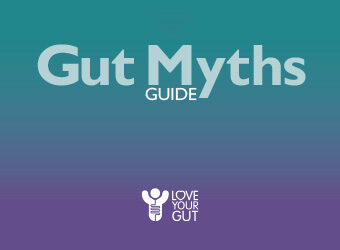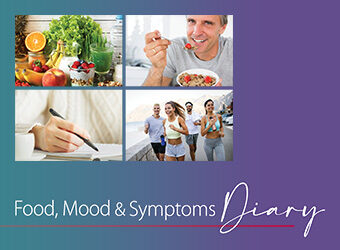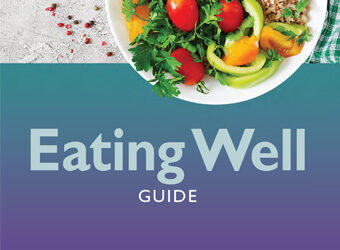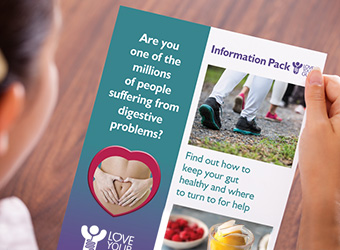These questions have been answered by Dr Nick Read, gastroenterologist, psychotherapist and medical adviser.
A rumbling in the tummy.
The clue is that it occurs around your period. Some women do become more anxious and tense just before their periods, and this can make the bowel more sensitive to distension and may even cause more food to be fermented in the colon. Reduce your intake of gassy foods.
Abdominal pain, could it be something else?
The pain of IBS is often described as griping, twisting, strangling or dreadful. It tends to be felt more in the lower abdomen especially in the corners and is often associated with a change in bowel habit. The symptoms are often triggered by something that’s happened or something you’ve eaten.
But abdominal pain can be caused by lots of diseases. You can get a clue from where it is coming from by the type of pain, where and when you feel it and whether it’s associated with other symptoms.
The pain of a duodenal ulcer is usually felt under the end of the breast bone and is often described as boring or like a knife. It is relieved by eating or taking antacids, but comes back again about two hours after food. It may be associated with vomiting and can wake a person up at night.
The pain of a gastric ulcer is similar but may come on as soon as you have eaten.
Inflammation of the gall bladder associated with gallstones is often experienced as soreness below the right ribs which goes round under the shoulder blade. It is often associated with an empty feeling in the stomach and belching and is made worse by eating fatty food. If a stone blocks the bile duct, it causes biliary colic. This is a bout of very severe central abdominal pain that comes in waves and builds to a crescendo and then dies away over the course of several days as the stone is passed. It is often associated with vomiting.
Pancreatitis usually begins with pain in the upper abdomen that sometimes goes through to the back. The pain may feel worse after eating, but often gets much worse. A person with acute pancreatitis usually looks and feels very ill with a swollen and tender abdomen, vomiting and a fever and needs immediate medical attention. Pancreatitis may be caused by an alcoholic binge or when the pancreatic duct gets blocked by a stone.
Renal colic is caused by the passage of a stone down the ureter. It is a severe crampy pain that starts in the loins and spreads round and down to the pelvis. It builds to a crescendo, is often associated with vomiting but dies away when the stone is passed, leaving a bruised feeling.
Cystitis or inflammation of the bladder is felt above the pubis and is usually associated with a frequent desire to pass urine and a stinging sensation when urine is passed.
Dysmenorrhoea is a crampy pain above the pubis which occurs around the time of your period.
Could I have an allergy?
Food allergy is a rare cause of Irritable Bowel Syndrome (IBS). Besides you seem to react to so many different foods. It is more likely that your gut has become unusually sensitive and intolerant to many different foods. Intestinal sensitivity is a common feature of IBS.
The foods that upset the sensitive gut most are those that cause contraction or gaseous distension. These include fatty foods, coffee, and hot spices and wheat bran and also foods that are fermented in the bowel such as oats, soft fruits, some vegetables (onions, beetroot, cauliflower and sprouts) and pulses (peas, beans and lentils) and in some people, milk.
Remember, food and mood interact with each other. If you are upset about anything, then your gut will be much more sensitive and react more to what you eat. At those times, it may be best to eat a bland diet – rice, boiled potatoes (without butter), vegetables in moderation, a little fruit, low fat milk, steamed fish, white bread, low fat spreads and baked chicken. And if you’re still having difficulty, do discuss this with a dietitian.
But don’t regard this as a life sentence. As your IBS calms down, you can reintroduce some of the things you like and get back to a normal diet.
Could it be anything else?
The combination of weight loss and anaemia indicates that there may well be another cause for your symptoms. You may have coeliac disease or even bowel inflammation. Cancer is unlikely because of your age. There are good blood tests that screen for coeliac disease these days and there is a simple stool test (faecal calprotectin) for bowel inflammation. But in view of this combination, it would be prudent to refer you to hospital for investigations such as colonoscopy and jejunal biopsy.
Dietary Fibre. What can I eat?
There is a distinction between soluble fibre and insoluble fibre. Insoluble fibre is the woody husks of cereals and the skins of fruits. Soluble fibre is pulpy interior of fruits and the milled oats and wheat. Recent research has suggested that insoluble fibre tends to cause more pain and soluble fibre is kinder on the gut.
However, many of the sugars and starches in fruit and vegetable are not well absorbed in the small intestine and are fermented by colonic bacteria releasing gas, causing pain and bloating in some people. Prunes, plums and figs may be particularly likely to do this, but they are also mild laxatives. Pulses (peas, beans and lentils), beetroot, cabbage and Brussels sprouts, may also release a lot of gas.
But people vary. The best thing to do is to acknowledge the guidance but find out what and how much suits you and what doesn’t.
How can I cope with constipation?
First of all a few simple things.
Try to relax. Don’t sit working in front of your computer all the time. Take a break every hour; get up walk around, chat to a friend. Take regular exercise. Eat a diet that will encourage a good bowel action. Increase the amount of cereal fibre in the diet. Try taking oats with dried fruits. Eat more fruit. Plums and prunes are particularly effective. Eat more vegetables. Beetroot is particularly effective at loosening the stool. But remember all of these can make symptoms of pain and bloating worse, so you might need to adjust the amounts until you find what suits you best.
Drink at least a litre (approximately two pints) of fluid every day. Develop good bowel habits: Get into the habit of going at the same time every day. When you have the urge to open your bowels, don’t hold on, try to go as soon as you can. Don’t hold on to wind. Find somewhere where you can release it without embarrassment. Make sure your toilet is warm and comfortable. Do not strain when you are trying to open your bowels. Sit up straight, put your hands on your hips, breathe deeply, relax and then when you feel the urge coming, gently push down. If your motion does not come after – five minutes or so, get off the toilet and wait for the urge to come back. Seek advice from your GP on issues such as laxatives.
How can I manage my diarrhoea?
First of all, be careful of what you eat (and drink). So, while your bowels are very active, eat a bland diet, such as steamed white fish or chicken, rice, potatoes and some green beans. Do not eat fatty or fried foods Avoid coffee or food containing hot spices like chilli or pepper. Reduce your intake of fruit and vegetables such as onions, beetroot and brassica (cabbages, cauliflower and sprouts). Many people with unexplained diarrhoea have lactose intolerance. Try taking a probiotic. Diarrhoea will flush out the beneficial bacteria from your bowel so try restoring these with a month’s trial of a daily probiotic. Slow down and pace yourself.
Remember if you are anxious and busy, your bowel is likely to be active too. Build time to rest into your busy schedule. Get help to deal with any particular issues that are upsetting you. Many treatments for diarrhoea can be obtained over the counter from your local chemist. Loperamide (Imodium) is the most powerful of these and has few side effects.
How can I manage the pain?
Take time out to relax, breathe deeply, listen to a relaxation tape, practice meditation or yoga, distract yourself by reading, watching a film, listening to music, take a hot bath, cradle a hot water bottle, reduce the amount of fermentable starches and sugars in your diet. Take peppermint oil or other antispasmodic medications. Try complementary therapies, especially hypnotherapy, acupuncture, therapeutic massage, reflexology, counselling. And if nothing works, do go back and see your doctor.
How can my symptoms be caused by IBS?
IBS is not a disease like colitis or peptic ulcer. The symptoms are so variable. It’s not just that some have diarrhoea, some constipation, some bloating, but the context in which these occurred and the range of other symptoms that occur at the same time are so individual and idiosyncratic, that they appeared to be a unique bodily expression of the personality and what has happened to it.
IBS does not involve a structural change in the gut, but is often a change in bowel function brought on by the events and situations that occur in a person’s life, particularly those events that are difficult to think about and deal with.
Research has suggested that if a person suffers a gastrointestinal illness at the same time as they are undergoing some emotional stress in their lives, then their symptoms may be activated every time they are reminded of that stress and only eliminated when the particular memory is resolved or wears away. This can explain the persistence of IBS diarrhoea after an attack of gastroenteritis or the persistence of abdominal pain following abdominal trauma or surgery.
We all know that trauma itself can make a person feel physically ill, but perhaps we are not always aware that the form that illness takes may represent what the trauma means for us. The gut is often the route by which stress is expressed. How many of us have had diarrhoea when we are apprehensive, felt sick when we’ve heard bad news, developed abdominal pain when something has made us angry? But the way trauma is expressed in the body is highly individual and may involve symptoms that occur in other parts of the body.
Ileostomy for severe constipation
Colectomy and ileostomy (or ileorectal anastomosis) used to be standard treatments for severe slow transit constipation. They are performed less often these days because treatment options have improved (prokinetic drugs, biofeedback and antegrade colonic washouts using a peg) and some patients developed complications after a stoma, persistent constipation and difficulties managing a stoma. I should explore other options with your gastroenterologist first.
I’ve got a polyp. Does this mean I’ve got cancer?
Polyps are not uncommon in the colon as we get older. You can feel reassured in that your polyp did not show any evidence of malignancy. There is a chance that more polyps may develop and some may develop malignant change. Therefore you will need to have follow-up colonoscopies about every two years to check that the colon is clear. Try to feel reassured that something low grade has been picked up early and that your colon will now be under regular surveillance.
My stools vary so much. Is this normal?
People with IBS often have a very erratic bowel habit, with irregularity of stool form, consistency and frequency. The reason for this is that the irritable bowel overreacts to what is happening in your life and what you eat – food and mood.
Keep a symptom diary in which you can compare the nature of your stools with what you are eating and what is happening in your life. You may well begin to see a pattern and if you do, try to regulate your life a little more. Try to adopt a more consistent lifestyle, avoiding the foods and situations that upset or worry you. Take particular note of your intake of fruit, vegetables, cereal or fatty foods. You are obviously a careful observer. Use your powers of observation and experiment to help you regulate your bowels.
Pancreatitis
Pancreatitis rarely clears up completely. It can often lead to an impairment of pancreatic function which can last weeks or months and cause diarrhoea and pain when you eat. This is because the fat in your diet is not completely digested and it enters the large bowel where it acted upon by the bacteria and converted to what is to all intents and purposes a laxative (like castor oil). It sounds as if you will need to take supplements of pancreatic enzymes (such as Creon) sprinkled on your meals until this clears up.
Probiotics and prebiotics. Can they help with IBS?
Probiotics are live cultures of strains of bacteria similar to those that normally inhabit the colon.
When the normal beneficial bacterial ecosystem is depleted or upset by diarrhoea, antibiotics and stress, probiotics may help to restore a healthy bacterial environment, strengthening the gut immune system, restoring a healthy balance of bacteria and increasing the capacity of the colon to salvage nutrients. This can alleviate symptoms of diarrhoea and there is evidence that some strains of probiotics can reduce bloating. GPs cautiously suggest that they could be given a month’s trial.
Prebiotics are the preparations of the complex sugars that the beneficial species of bacteria feed on. Delivering the appropriate bacterial food encourages a natural growth of beneficial bacteria. At least one study suggests this may be beneficial in reducing bloating in some patients with IBS.
Should I worry about weight loss?
Weight loss for no obvious reason is worrying and needs to be investigated as soon as possible. Also, the raised ESR and CRP suggest the presence of inflammation. It is important you see your gastroenterologist about this so he or she can check that you do not have anything more serious. Have you been losing blood from your rectum? If so that is another red flag symptom that needs addressing as soon as possible.
Smelly wind.
Almost certainly. Many fruits contain sugars that are poorly absorbed in the small intestine. These then pass through into the colon where they are fermented by bacteria releasing gas. Although such gases are normally odourless, they carry with them other smelly gases and volatile substances which come from the bacterial metabolism of proteins.
Symptom Memory
The antibiotics you had a few years ago may have initiated a tendency to diarrhoea. The severe emotional trauma is enough to keep your symptoms going by reinforcing the symptom memory through chronic anxiety. Panic and depression can accelerate transit of food through the gut in some people and alter the composition of your colonic bacteria.
Ask your doctor to do some screening tests to make sure that you don’t have any lingering inflammation; reduce the amount of fruit and fibre in your diet and try a course of probiotics to alter your bacterial flora. Also consider talking to a counsellor about how to cope with the continuing stress in your life.
They say it’s due to stress. What can I do about that?
Many people find that their bowels seem to function as a kind of emotional barometer, indicating how they feel about what is going on their lives. There is a strong link between stressful circumstances and abdominal upset. Emotional tension always makes IBS worse.
Anxiety, frustration, despair, can all stimulate the emotional (sympathetic and parasympathetic) nervous system and this can tie your guts in knots, increasing sensitivity, causing spasms and pain, flushing it out one moment and holding it back the next. Rushing around trying to do everything has the same effect. If you are exhausted and stressed out, barely coping, ‘it is your bowels that can keep the score’.
Nobody can keep going for ever without a break. You are in the best position to reduce the stress in your life. Here are some tips:
Lead a balanced life
Don’t work all the time. Allow time to rest, relax, hang out with friends, play with the children, read, take some exercise, and enjoy your meals.
Make time
Make sure you have some time in the day for yourself. Give yourself time to think. Download a relaxation app and give yourself an hour a day to listen to it.
Self regulation
Try to instil a regular pattern or work, rest and play into your life, because if you can begin to regulate your life, then you will regulate your bowels as well. So take regular exercise, eat at regular times, go to bed at the same time, and take alcohol only in moderation. Make sure you wind down in the evening to optimise sleep.
Delegate
Do not shoulder the burden for everything. Encourage others to take responsibility for themselves.
Live in the present
Don’t spend too much time regretting the past; it’s gone. And don’t fret about the things you have to do. Work out a realistic plan.
Communicate
If there are problems that you can’t manage, try to talk to somebody about them. This will allow you to get them into perspective and create new opportunities to sort them out.
Join in
IBS can make you feel very lonely. And loneliness increases tension and will bring on IBS. So don’t let your illness rule your life. Get out and do things. Talk to your friends. Join in. Learn to relax. Build half an hour’s relaxation into your daily routine. Consider meditation or yoga.
Talk to somebody
Tell somebody you trust, what is bothering you. Let them help you try to work out what you can do about it. Consider talking to a counsellor or psychotherapist.
What are FODMAPS?
FODMAPs (Fermentable oligosaccharides, disaccharides, monosaccharides and polyols) are sugars and starches (carbohydrates) that are not well absorbed in the small intestine so that they are able to pass through to the colon where they can be fermented by bacteria.
This can result in the release of gas, stretching the gut wall and may cause symptoms of pain, bloating, wind and diarrhoea. FODMAPS are present in a variety of foods, including pulses (peas, beans and lentils), beetroot, Brussels sprouts, cabbage, cauliflower, Jerusalem artichokes, fruits with stones (plums, peaches, nectarines, cherries), apples and pears. Many people cannot digest milk sugar (lactose). For them, milk behaves like a FODMAP when it is drunk, and may cause much discomfort. Sugar-free mints and chewing gums may also contain sugar alcohols which can release gas in the colon.
So, reducing or excluding FODMAPs from the diet can reduce abdominal symptoms. But knowing what foods may be fermented is quite a complicated business since it is also dependent on how stressed you are and what bacteria you have in your gut. If simple reduction of these foods does not work, you may need to see a qualified dietitian who will help you choose the right regime for you. Remember, a low FODMAP diet is not a life sentence. People vary in their responses to fermentable sugars according to how they are feeling. Emotion tension, upset or worry can make the gut more sensitive and less tolerant of fermentable sugars. When life is more relaxed you will be able to tolerate more of these foods. Food and mood work together. Further information on FODMAPS is available here www.kcl.ac.uk/slcps/our-departments/fodmap
What causes bloating? Is it something I’ve eaten?
Bloating is a feeling of abdominal distension or pressure that may be accompanied by visible swelling of the abdomen. More women than men report that their stomach gets much larger during the day and by the evening they cannot wait to get home to put something loose on.
Bloating may be caused by eating sugary or starchy foods that are not completely absorbed in the small intestine, but are fermented by the bacteria in the colon which generate excessive amounts of gas.
Such foods include fresh or dried fruits, especially plums, prunes, apricots, peaches apples, pears, incompletely ripened bananas, pulses,(beans, peas, lentils), root vegetables such as onions, beetroot, carrot, parsnip, reheated potato, cereals like oats and wheat, chewing gum and large quantities of milk and cream.
So, reduce your consumption of gassy foods. But you don’t have to eliminate them completely. As your bloating starts to improve, you can re-introduce more of these foods into your diet. Some probiotics are said to contain strains of bacteria that only generate small volumes of gas and hence reduce symptoms of gas and bloating.
Some prebiotics may also reduce bloating because they promote the generation of bacterial species that generate less gas.
But the symptom of bloating is not just caused by excessive gas production; it’s also related to increases in bowel sensitivity and hold up of gas by spasm. Patients often report that exercise, stress and an impending period may make bloating worse, probably because the increased activation of the sympathetic nervous system sensitises the bowel and causes spasm.
Relaxation, hypnotherapy and meditation can all help to decrease the sensitivity and spasm in the bowel and reduce the frequency and severity of bloating. Antispasmodic drugs can also be helpful. These can be purchased over the counter at most pharmacists. Bloating is one of the major symptoms of Irritable Bowel Syndrome, but rarely it may also be caused by coeliac disease, Crohn’s disease, gallstones or ovarian cancer.
